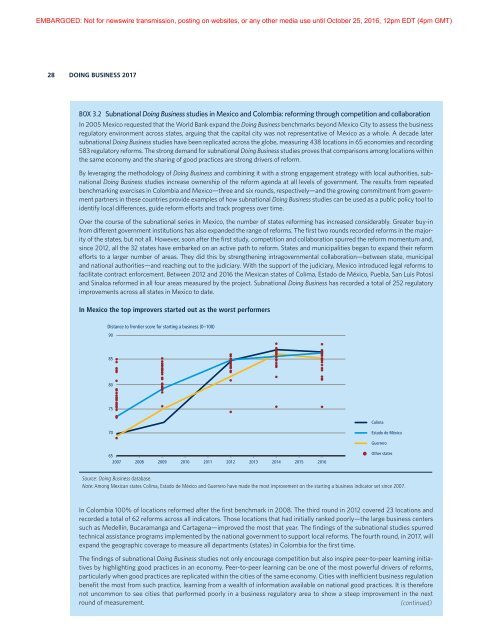49709doing-worldbank
49709doing-worldbank
49709doing-worldbank
You also want an ePaper? Increase the reach of your titles
YUMPU automatically turns print PDFs into web optimized ePapers that Google loves.
EMBARGOED: Not for newswire transmission, posting on websites, or any other media use until October 25, 2016, 12pm EDT (4pm GMT)<br />
28<br />
DOING BUSINESS 2017<br />
BOX 3.2 Subnational Doing Business studies in Mexico and Colombia: reforming through competition and collaboration<br />
In 2005 Mexico requested that the World Bank expand the Doing Business benchmarks beyond Mexico City to assess the business<br />
regulatory environment across states, arguing that the capital city was not representative of Mexico as a whole. A decade later<br />
subnational Doing Business studies have been replicated across the globe, measuring 438 locations in 65 economies and recording<br />
583 regulatory reforms. The strong demand for subnational Doing Business studies proves that comparisons among locations within<br />
the same economy and the sharing of good practices are strong drivers of reform.<br />
By leveraging the methodology of Doing Business and combining it with a strong engagement strategy with local authorities, subnational<br />
Doing Business studies increase ownership of the reform agenda at all levels of government. The results from repeated<br />
benchmarking exercises in Colombia and Mexico—three and six rounds, respectively—and the growing commitment from government<br />
partners in these countries provide examples of how subnational Doing Business studies can be used as a public policy tool to<br />
identify local differences, guide reform efforts and track progress over time.<br />
Over the course of the subnational series in Mexico, the number of states reforming has increased considerably. Greater buy-in<br />
from different government institutions has also expanded the range of reforms. The first two rounds recorded reforms in the majority<br />
of the states, but not all. However, soon after the first study, competition and collaboration spurred the reform momentum and,<br />
since 2012, all the 32 states have embarked on an active path to reform. States and municipalities began to expand their reform<br />
efforts to a larger number of areas. They did this by strengthening intragovernmental collaboration—between state, municipal<br />
and national authorities—and reaching out to the judiciary. With the support of the judiciary, Mexico introduced legal reforms to<br />
facilitate contract enforcement. Between 2012 and 2016 the Mexican states of Colima, Estado de México, Puebla, San Luis Potosí<br />
and Sinaloa reformed in all four areas measured by the project. Subnational Doing Business has recorded a total of 252 regulatory<br />
improvements across all states in Mexico to date.<br />
In Mexico the top improvers started out as the worst performers<br />
Distance to frontier score for starting a business (0–100)<br />
90<br />
85<br />
80<br />
75<br />
Colima<br />
70<br />
Estado de México<br />
Guerrero<br />
65<br />
2007 2008 2009 2010 2011 2012 2013 2014 2015 2016<br />
Other states<br />
Source: Doing Business database.<br />
Note: Among Mexican states Colima, Estado de México and Guerrero have made the most improvement on the starting a business indicator set since 2007.<br />
In Colombia 100% of locations reformed after the first benchmark in 2008. The third round in 2012 covered 23 locations and<br />
recorded a total of 62 reforms across all indicators. Those locations that had initially ranked poorly—the large business centers<br />
such as Medellín, Bucaramanga and Cartagena—improved the most that year. The findings of the subnational studies spurred<br />
technical assistance programs implemented by the national government to support local reforms. The fourth round, in 2017, will<br />
expand the geographic coverage to measure all departments (states) in Colombia for the first time.<br />
The findings of subnational Doing Business studies not only encourage competition but also inspire peer-to-peer learning initiatives<br />
by highlighting good practices in an economy. Peer-to-peer learning can be one of the most powerful drivers of reforms,<br />
particularly when good practices are replicated within the cities of the same economy. Cities with inefficient business regulation<br />
benefit the most from such practice, learning from a wealth of information available on national good practices. It is therefore<br />
not uncommon to see cities that performed poorly in a business regulatory area to show a steep improvement in the next<br />
round of measurement.<br />
(continued)


